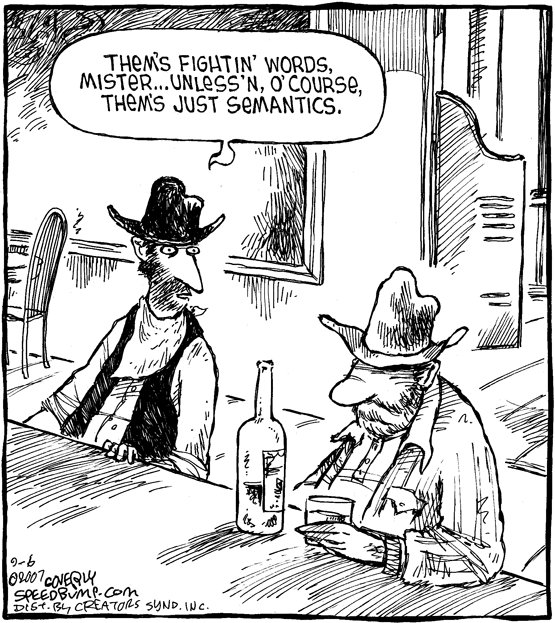“Semantics” is not a bad word

Planning, teaching and assessing in the PYP framework involves a great deal of thought, deliberation and discussion. It involves establishing a strong sense of purpose. It involves a strong dedication to the pursuit of understanding. It involves a search for meaning. This is what makes the PYP special, what separates it from other models of education. It is an intellectual model of education that has high expectations for both students and teachers alike.
However, we still find ourselves at the planning table with so-called “PYP Teachers”, both experienced and inexperienced, who are reluctant to do the thinking that is crucial if their pedagogy is to be purposeful, to be in the pursuit of understanding and to be a genuine search for meaning.
The main opt-out clauses for people like this are the following sentences:
“This is just semantics“
“Why are we wasting our time just talking about words?’
“I don’t have anything to add to this conversation, its a waste of my time”
Not only are these sentences frightening indicators of an educator’s willingness (or even capacity) to think, they are also an even more frightening indicator of their ability to challenge their students’ thinking.
Furthermore, in the context of planning in a PYP context, the use of “semantics” as a bad word can instantly suck the intellectual energy from a group of people who are trying to figure out why, how and what their students could or should be learning. People who utter the sentences above seem to have a strange kind of power. They tap into an underlying laziness that we all possess and that tells us it is indeed easier to stop grappling with the words that describe the meaning of what we will teach our students than it is to continue doing so. It is easier to walk out of the room without really understanding what we’re doing, how we’re going to do it and – most importantly – why we’re doing it. It is easier just to go ahead and teach some stuff than to genuinely think about it.
The bad news is that easiness is a fast track to mediocrity. To avoid the thinking is to deny ourselves, our colleagues and our students the opportunity to understand and to find meaning in what we do and to do everything to the very best of our capabilities.
As a PYP Coordinator, I adore and am drawn to those who are willing to do the thinking, who enjoy the thinking… who crave the thinking! But, what do I do with those who consistently seek to avoid it, who use “semantics” as a bad word and who infect other people around them with their corrosive, lazy power?
In all honesty, the natural response is to have little or no respect for them as educators… and particularly not as PYP educators. The natural response is to hope they move to another school as quickly as possible! Of course, sometimes there is a glimmer of hope and people can be rescued if they’re put in a team of thinkers. I have seen that happen a few times, but not many.
If they’ve been working in PYP schools for a long time and still have the same attitude then, I’m afraid, they should be advised to go back to another type of pedagogy where most, or all, of the thinking has been done for them.
If they’re still new to PYP and have already taken on that attitude, it may just be because they’ve been to a very bad workshop, worked in a mediocre school or been infected by the mentality of a former colleague. People like this may just, consciously or subconsciously, be in need of some inspiration.
It must be said, though, that being a PYP teacher… a good PYP teacher, demands that you put in the thought, that you deliberate over purpose and meaning – either alone or with your colleagues – and that you continuously reflect on what you and your students are doing. If you’re not willing to do these things, and get a kick out of them, it’s probably best to teach in a different framework – don’t spoil it for everyone else!

Great post! I couldn’t agree more. I find that ‘semantics’ thinker really draining and hinder real learning. It is draining and really challenging ways of finding their strengths to extend them slightly. I find some even have the power to ‘just get the job done’ with their peers. Working with teams can be so challenging and inspiring… yet we seem to go into collaborative planning trying to inspire the ‘I have no time’, ‘This is a wast of time’, ‘I have already planned next week’ types to think differently… maybe thats why I am going grey! Often Frustrated!!!
Having been in numerous planning meetings, i completely agree with you that this attitude is tiring and brings everyone on the team down. Thank you for sharing this. I will definitely share it the teachers at my school.